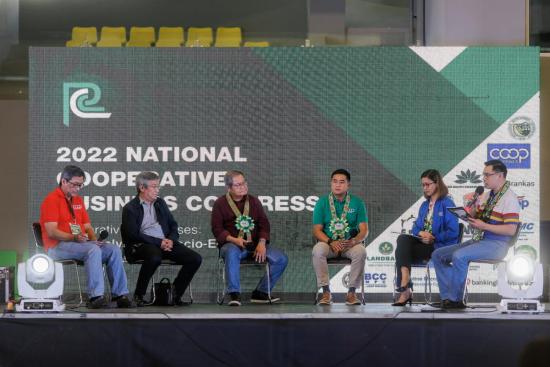
The Philippine Cooperative Center (PCC) held the first National Cooperative Business Congress (NCBC) on 28 and 29 November 2022 at the NOVADECI Convention Center in the Philippines. The NCBC was a two-day event that aimed to (1) promote financial programs, best practices, business undertakings, and roles; (2) create an avenue for discussion of the ongoing crises; (3) recommend possible actions/solutions to address the current crises and challenges of the country (Food, Health, Energy, Public Transportation, among others); and (4) link up the Cooperative Sector with other institutions to help solve crises and other economic and social issues.
NCBC saw participation from 632 delegates in person and 251 delegates online. The Congress was divided into 4 plenaries each focusing on food, health, transportation, and energy crises in the country. Key Credit and Financial Services Cooperatives jump-started the Congress by presenting their best practices, projects, and current challenges. Cooperatives like 1CISP, CLIMBS, NATCCO, and MSCB emphasized the need to improve financial literacy programs and assist smaller cooperatives. They also promoted concern for the community and climate adversity.
The 1st plenary focused on four major issues in food security: (1) its availability, (2) affordability, (3) safety and nutrition, and (4) resilience and sustainability. In addressing food security, experts point ed to an effective food supply chain management – of the food value chain. The food value chain can be dissected into 4 integral processes: Production, Processing, Marketing, and Consumption. Any disruption among these 4 processes would affect the indicators for food security. Agri-based (from agriculture, agrarian, aquaculture, farmers, dairy, fisherfolk, based cooperatives) and Marketing (consumers, marketing, producers, and logistics) Cooperatives are in forefront of issues related to production, processing, and marketing aspects of the food value chain.
The 2nd plenary focused on health services. The speakers noted the conundrum of health coops providing affordable health care while struggling with financial issues due to delayed PhilHealth payments, high capital requirements, and the ongoing pandemic. Several solutions were discussed such as utilizing technology to move consultations online and provide seminars to their members on topics like mental health. Another solution discussed was the need for cooperation among the different cooperatives by patronizing each other's services, and investments coming from the billionaire cooperatives.
The 3rd plenary discussed the ongoing challenge of the government’s public transport modernization program - high cost of expenses, lack of solidarity or alignment of services from local government units and agencies like LTFRB, and the large expense/capital infusion needed to embrace the modernization program. Some of the solutions mentioned were taking loans from the government-owned Land Bank, lobbying for more favorable policies especially the subsidies from the government that must be extended to the cooperatives financing the modern jeepneys, the institutionalization of the PUV Modernization Program, and expanding their range of services.
During the 4th plenary, the electric provider cooperatives discussed the ongoing challenges of competing with large corporations, high capital requirements of rural electrification, reliance on environmentally detrimental coal-fired power plants, and infrastructural problems of the existing grids. Some solutions discussed were the need for collaboration between different electricity-providing cooperatives to drive down prices and push for renewable sources of energy.
The 2022 NCBC also had additional plenaries that discussed concerns and projects for and of the cooperative sector namely “measuring cooperatives’ social impact,” creation of a comprehensive cooperative-owned data registry, and the ongoing challenge of cooperative digitalization.
In the concluding session, participants agreed on action points which included - more robust and active participation of the cooperatives in the Philippine Development Plan 2023–2028, empowering the cooperative movements as actors in the socio-economic development of the country and it sees itself as an ally in achieving the socio-economic agenda of the government and its long-term vision.
The Congress also featured solidarity messages from the ICA President, Mr. Ariel Guarco, who emphasized the intervention capabilities of cooperatives, and ICA-AP Regional Director, Mr. Balu Iyer, who pushed for digitalization and ensuring cooperative access to digital cash transfers. Under Secretary and Chairperson of the Cooperative Development Authority, Mr. Joseph Encabo mentioned the social obligation of cooperatives and said, “As a social enterprise, I believe that cooperatives have their own moral obligations, not only to the members but also to the community where we belong.”



